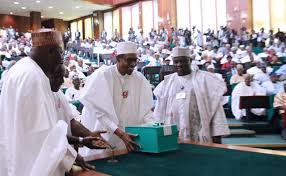President Muhammadu Buhari on Thursday disclosed that the Federal Government’s share of oil revenue as at July this year totalled N570.23 billion, representing 51 percent shortfall from the budgetary target for the seven months period.
Buhari gave this hint in his address on the proposed N16.39 trillion Appropriation Bill 2022 at the National Assembly.
He attributed the poor performance of oil revenue relative to the budget largely due to the shortfall in production as well as significant cost recovery by NNPC to cover the shortfall between its cost of importing petrol and the pump price.
This is even as he said that non-oil tax revenues totalled N964.13 billion, representing 11 percent higher than the projections from the revenue source during the period.
The President recalled that in March 2020 the Petroleum Products Pricing Regulatory Agency (PPPRA) announced that the price of petrol would henceforth be determined by market forces, noting, however, that as the combination of rising crude oil prices and exchange rate combined to push the price above the hitherto regulated price of N145 per litre, public opposition against the policy of price deregulation, particularly the organized labour, made the price deregulation plan impossible.
Due to the public opposition, he said government had to suspend further upward price adjustments while engaging Labour on the subject. This petrol subsidy significantly eroded revenues that should have been available to fund the budget.
Buhari maintained that the sustained improvement in non-oil taxes indicatedthat some of our revenue reforms are yielding positive results and expressed government’s optimism about further improvement in revenue collections later in the year as more corporate entities file their tax returns and government accelerates the implementation of its revenue reforms.
On efforts by the government to improve revenue generation and administration, he said: “We have stepped up implementation of the strengthened framework for performance management of government owned enterprises (GOEs), with a view to improve their operational efficiencies, revenue generation and accountability.
“The 50% cost-to-income ratio imposed on the GOEs in the Finance Act 2020 has contributed significantly to rationalizing wasteful expenditures by several GOEs and enhanced the level of operating surpluses to be transferred to the Consolidated Revenue Fund (CRF).
“I solicit the cooperation of the National Assembly in enforcing the cost-to-income ratio and other prudential guidelines during your consideration of the budget proposals of the GOEs, which I am also laying before you today”, Buhari pleaded.
Speaking on the expenditure side of the 2021 budget, the President disclosed that as at end of July 2021, a total of N6.79 trillion had been spent as against the pro-rated expenditure of N7.91 trillion
He explained that this translated to N4.17 trillion deficit which was financed through domestic borrowing.
On the performance of the capital budget so far, Buhari told the lawmakers that as at October 4 this year, despite the revenue challenges, government had released a total of N1.732 trillion for capital expenditure even as it has consistently met the nation’s debt service commitments.
The President told the lawmakers that the Appropriation Bill 2020 projections were based on the 2022 2024 Medium Term Expenditure Framework and Fiscal Strategy Paper (MTEF-FSP) parameters.
He listed the parameters as including conservative oil price benchmark of US$57 per barrel; daily oil production estimate of 1.88 million barrels (inclusive of Condensates of 300,000 to 400,000 barrels per day); exchange rate of four 410.15 per US Dollar; and projected GDP growth rate of 4.2 percent and 13 percent inflation rate.
On revenues projections, Buhari explained that based on these fiscal assumptions and parameters, total federally-collectible revenue was estimated at N17.70 trillion during the fiscal year.
He expatiated: “ Total federally distributable revenue is estimated at 12.72 trillion Naira in 2022 while total revenue available to fund the 2022 Federal Budget is estimated at 10.13 trillion Naira. This includes Grants and Aid of 63.38 billion Naira, as well as the revenues of 63 Government-Owned Enterprises.
“Oil revenue is projected at 3.16 trillion Naira, Non-oil taxes are estimated at 2.13 trillion Naira and FGN Independent revenues are projected to be 1.82 trillion Naira”, Buhari added.
This is even as he proposed a total expenditure of N16.39 trillion for the Federal Government in the 2022 fiscal year.
He explained that the proposed expenditure comprised Statutory Transfers of N768.28 billion; Non-debt Recurrent Costs of N6.83 trillion; Personnel Costs of N4.11 trillion; Pensions, Gratuities and Retirees’ Benefits N577.0 billion; and Overheads of N792.39 billion.
Others are, Capital Expenditure of N5.35 trillion, including the capital component of Statutory Transfers; Debt Service of N3.61 trillion; and Sinking Fund of N292.71 billion to retire certain maturing bonds.






